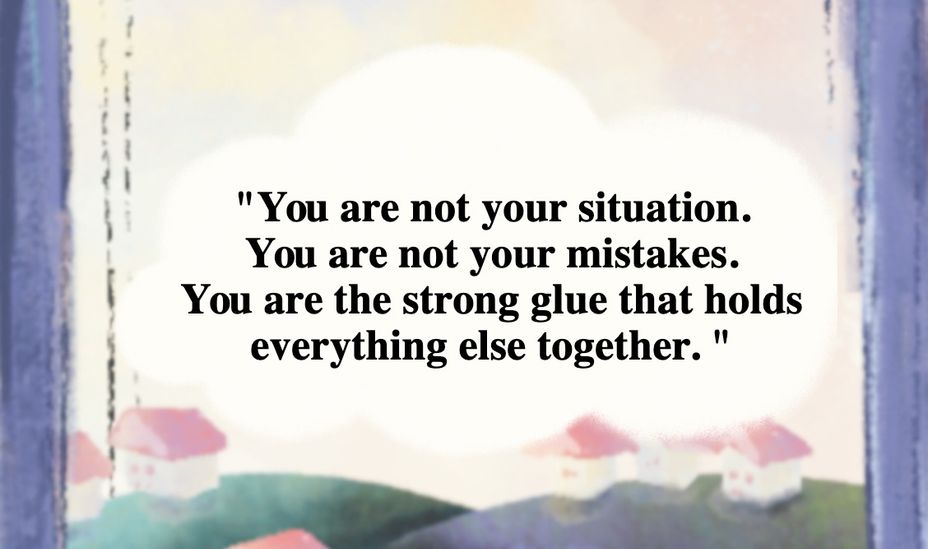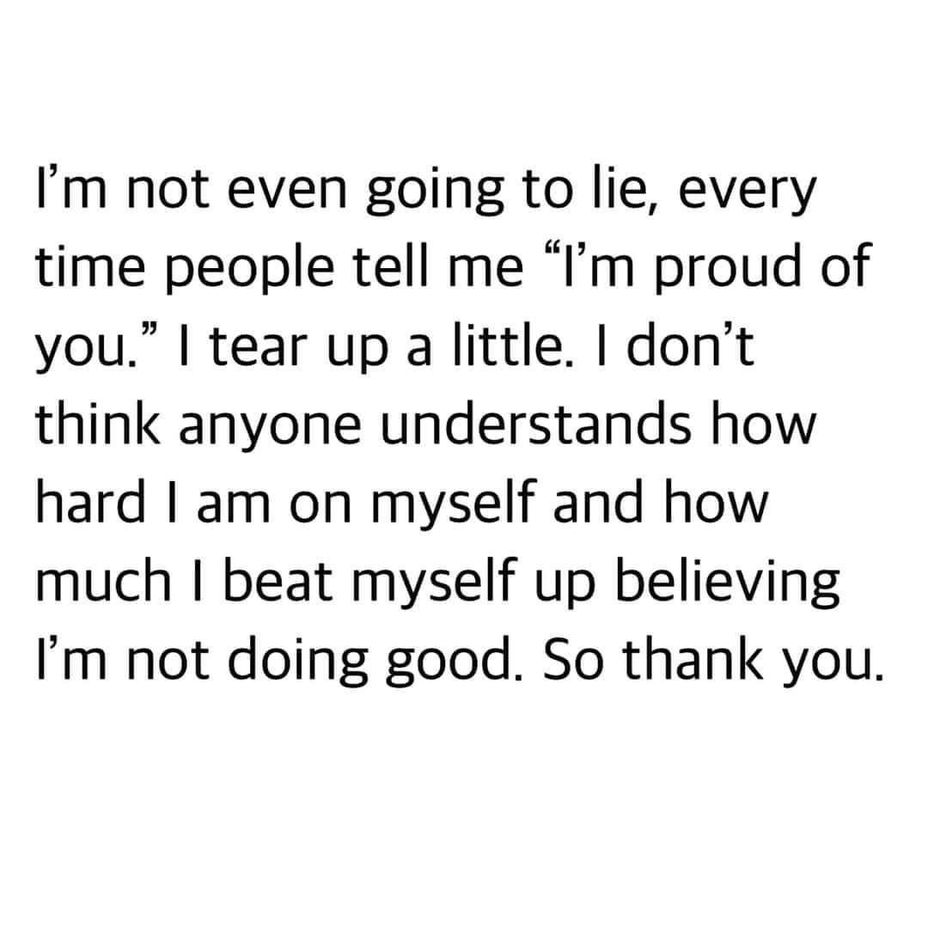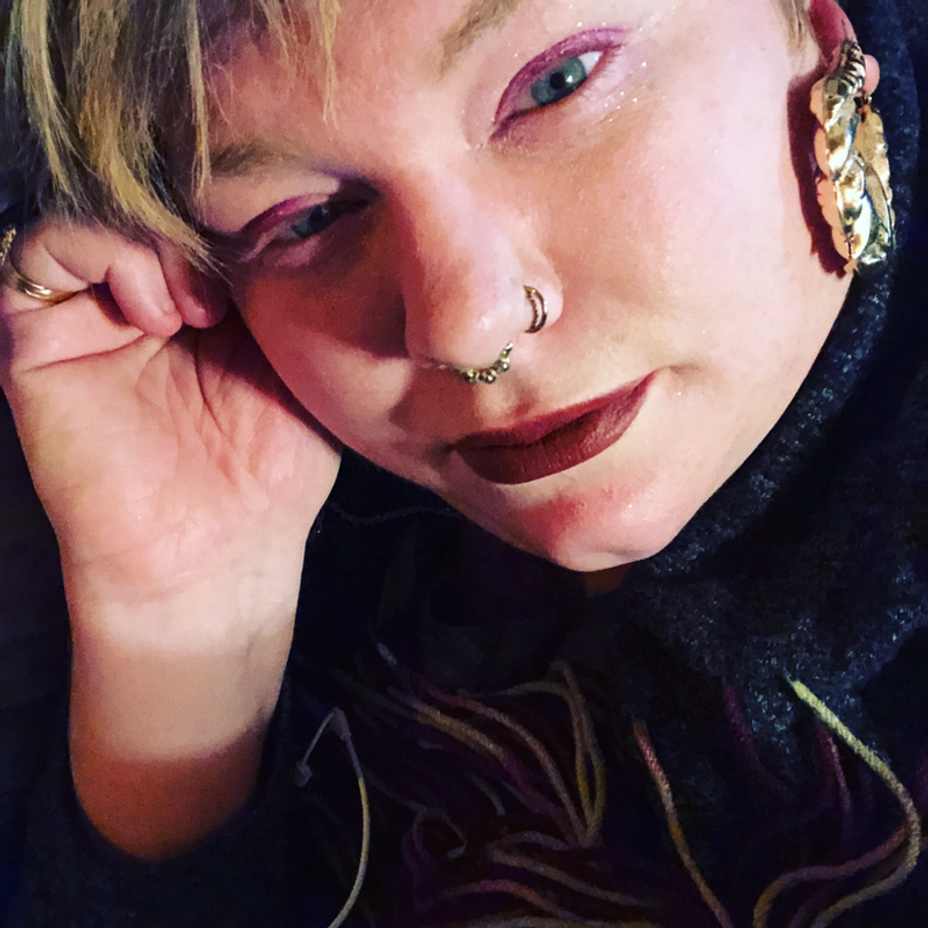Ohhhh man! What an affirmation!? This can literally make u cry (release) or become elated (reassurance)... Such a good one! (I received tonight).... Had to share...much love and strength to everyone 💜💪🙌 #release &letgo #reassurance &light #ChronicIllness
reassurance

Seeking reassurance from your therapist
As a child, I was left alone to deal with my problems. I became hyper independent. That’s where the bad coping skills came from. I was 7 years old when I first cut myself. I still to this day have no clue how in the world a 7 year old tells themselves I will cut myself to feel better. Until in the last years that I realized I needed someone to talk to about my experiences, share my feelings with (my stupid feelings and emotions that I never fucking understand or know what they are) and to help me organize my emotions and their meanings. That is why I initially seeked a therapist. I wanted to understand better why I keep on having my suicidal thoughts and get help managing them so they are less invading. I only recently realized that we (my therapist and I) have created a safe place together for my thoughts, but now it is like I am doubting it again because of last session. What I somewhat understood is that: reassurance seeking leads to over explaining, over apologizing, what if and doubts which come from shame/abandonment issues.
After reading a little online, I can conclude that excessive reassurance seeking is addictive. Like any addiction, the more you do it, the more you want it. It’s an immediate relief like self harm. It is quick and relieves the anxiety that is rumbling through your head. Like self-harming, the relief does not last, and you seek it more and more. The problem with reassurance is that, in the short term, it decreases your anxiety. However, in the long term, it creates a vicious cycle that worsens your anxiety and increases your need for more reassurance. It also decreases your confidence in your ability to answer your own questions and reinforces that you are unable to tolerate the discomfort of uncertainty. How do we fix it? “By exposure and response prevention. This involves repeatedly facing the fear and choosing not to seek reassurance (i.e. not to check, measure, ask, review, and do). Exposure can be paced to slowly and purposely help the person reduce the reassurance seeking. Anxiety levels will eventually fall and the individual learns that reassurance-seeking is not needed to reduce anxiety, the feared outcome does not occur and that they have power over their thoughts and actions.” It all seems very straightforward and easy to do when you read it but emotions and feelings are mixed with all this and that is where it gets complicated. I understand I need to learn how to tolerate uncertainty. Uncertainty is not danger, its distress, it’s a feeling, and it’s not an indication of real danger in the world. I need to change how I respond to it so I no longer seek reassurance, but how do I do that when I lived in a world where no one was safe, every time I trusted someone, it literally backfired. I was either criticized, laughed at, or misunderstood. And even as I grew older, I tried trusting more, forgiving more, being more tolerant with people and they still proved my anxieties were right. My gut feelings are rarely false now. I know how to read people so I do not get hurt, so I know what to expect. The only person I have trouble reading is my therapist and it is quite anxiety provoking. I don’t know why and it’s a piss off.
Since the beginning my therapist has been telling me to trust people more, be more vulnerable with them. Part of seeking validation and reassurance is also asking for help and being courageous enough to ask for help when needed. Don't all humans do that? Why is it bad? The message that I retained from last session with my therapist is that asking for reassurance is bad and that I shouldn’t do it ever, especially with her and yet I started trusting her and being vulnerable with her. How do they expect me to be vulnerable and honest with them if sometimes involuntarily I have questions and want some reassurance? No one can be self-sufficient, even her. It’s literally impossible. Talking about my fears and insecurities is very hard for me and she knows that, but how am I supposed to do that without relying on her a little or expecting a little reassurance. It is a blessing to find people with whom we feel safe to share our vulnerability when we feel anxious or insecure. Sharing our thoughts, including our need for reassurance, builds trust and connection. How am I supposed to do one without the other? How am I supposed to be honest about my thoughts, my feelings and questions I wonder? Yes, I worry about other people’s feelings, including my therapists. I can’t help it. I do think I am a burden to everyone around me, including her even without any concrete evidence. It is a feeling so ingrained in me that I can’t shake it off because maybe I’ve been told most of my life to shut up because I talk too much and talk too loud. I know she is a human too. I know how difficult it is to remain neutral all the time, to not show your opinion. Unloading onto someone is hard for me because the only thing I’m telling myself is don’t complain too much, don’t unload too much because they will leave. Don’t talk too much or take too much space or else they will stop this. I wish I could press a button and press stop but it goes so fast. I’m starting to realize that a lot of questions and things I ask to my therapsit are a reflection of my opinion about myself as well. I have zero self-compassion, zero self-confidence and zero knowledge on knowing how to reassure myself. I look bad right now, but being honest is so much more important to me. The only way to trust people is with honesty, especially if I want to trust myself one day. #Therapy #Therapist #Anxiety #Depression #BorderlinePersonalityDisorder #reassurance #Selfblame #Selfharm #SuicidalThoughts #Trust #vulnerability
A little hope and encouragement
I know a lot of people on here are here because they are actively struggling. Whether it is psychological or physical, chronic or acute, we are mostly in the middle of the struggle. Is there anyone out there who has gotten through and has come out on the other side and is doing well? Like, really well? I recognize that there is no complete cure for most of the ailments that we discuss on The Mighty, but I just need to know that there actually is a light at the end of the tunnel, and life can be okay eventually. Thank you for the support from everyone! #Anxiety #Depression #ChronicIllness #PosturalOrthostaticTachycardiaSyndrome #Spoonie #MentalHealth #reassurance #optimistic

#reassurance helps more than they know!
I am my own worst critic. So any time, and I mean every time, anyone tells me they are proud of me I literally have so many emotions running through me!!! With my diagnosis’s ( #BipolarDisorder #BorderlinePersonalityDisorder #Anxiety #Agoraphobia ) I need a lot of reassurance...which is hard sometimes for the ppl closest to me. When I am not doing so good, I practically beg and/or demand reassurance. So when anyone says they are proud of me that means the world to me. #mentalillnesses suck! But we are all strong and will get through this-one reassurance at a time ❤️
Does anyone else feel like they apologize so much but never receive any apologies in return so it leaves you feeling like you're always at fault?
Does anyone else feel like they apologize so much but never receive any apologies in return it still leaves you feeling like you're always at fault and they're never not wrong. Do people really believe they're always right and so they don't apologize? This is me on anxiety. I want reassurance but then my reverse psychology kicks in with questions like this. I think I think too much. #Anxiety #apologizing #reassurance #Feeling
Moving house
My partner and I viewed a house today and we loved it, we are sending the application off tomorrow.
My, anxiety, is, sky, high, already lol!! If I dont laugh I'll cry..
We havent even been accepted yet and the move is sending my already jumbled head into a spiral.
Wish me luck Mightys #Movinghouse #Anxiety #Worrying #reassurance
chaotic thought
I had that thought today..
On those supporting groups for DID and BPD, everyone feels lonely yet we’re all supporting each other and we all share the same pain, weird thoughts, crazy unexplainable needs..
But it seems that everyone of us needs someone “normal” to accept, love and support is unconditionally, to prove that despite all of this shitload we’re still valid..
In different words..
We need the reassurance to come from someone who’s different..

Guilt within my Head
It’s Thanksgiving weekend and I’m at my mama-in-law’s with my partner. And, while it has been a great visit, all I can think about is how his family must see me as a fraud-faker-liar-hypochondriac-crazy-lazy-burden. I had to medically resign from a job I loved but could only keep for four months due to my myriad of chronic illnesses back in October and have since started the process of applying for SSI/SSDI. I have not been able to keep a job for longer than four months for the last three years, no matter how hard I’ve tried. My symptoms really started ramping up at the tailend of 2016, which coincidentally is also when my partner and I started seeing each other. So his family never got to know the pre-fibromyalgia emily bee. The emily bee with the strong work ethic and the long term job, a CAREER in reproductive health.
They only know me as who I am now. And I worry what they think of me, the things they aren’t saying, the things that maybe my partner is too kind to tell me. I feel embarrassed, ashamed, paranoid.
I love my partner and I love his family, and they have never made me feel unwelcome. But I’m terrified that they think I’m full of shit, using my partner and playing the system. I’m just trying to survive. And these self-imposed misgivings have made this visit a lonely, anxious nightmare.
All I want is reassurance that none of my thoughts are real. But to ask that of my partner feels burdensome for him as well.
Chronic illness is a cold, quiet, lonely monster. It doesn’t just cause my body unbearable pain and ache, it’s hurting my self-worth, too. #Fibromyalgia #MyalgicEncephalomyelitis #MyofascialPainSyndrome #DegenerativeDiscDisease #BipolarDepression #Anxiety #DoubtingMyself #ChronicIllness #Disability #Ssi #Ssdi #unemployed #Family #Worrying #reassurance
Struggling so much. Is it going to pass???
My depression is kicking my butt. I'm sad lonely and anxious. It got so bad I reached out to my school's guidance counselor ( she's awesome but also really busy but she had to go proctor testing and I feel bad for reaching out because she felt bad for not being able to talk to me. It made me regret saying anything I didn't get any helpful words so I'm still just as sad and scared as I was this morning. I feel like this is never going to end. I'm tired of feeling like this. Any advice Was I wrong to reach out #Depression #Anxiety #advicewanted #reassurance #Crying
MH day? #Depression #reassurance #Selfcare #Selfworth #Pain
Im on tour with my symphony and we have 3-5 hours of rehearsal every day and 3 hours of class every other day. I’ve been feeling very overwhelmed and my depression has been really bad since we visited a former concentration camp on one of our outings. I (with the help of my therapist) decided that I need to take a mental health day tomorrow to heal and get back on my feet. But my prof is trying to make me feel guilty and lazy for it saying I’m missing the most important day of class and couldn’t I make an exception? And then I got a mass email from my section leader reminding people that it is rude to get up and leave during rehearsal (I have permission to leave if I start having a panic attack and have had to leave a few times). I know I need to be in rehearsal and I need to be practicing and I need to be in class but I also know that I need to take care of myself, but they are almost convincing me to give in. Someone please remind me that my health is more important than my class? I feel so guilty even asking. Like I’m just trying to slack off.
